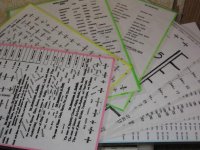Carl-NC
Bronze Member
- Mar 19, 2003
- 1,871
- 1,359
- Detector(s) used
- Custom Designs and Prototypes
- Primary Interest:
- All Treasure Hunting
Sandsted, on 12/12 you stated, "I've deliberately tested myself dating coins." Here is a test proposal:
I will mail you 10 coins, sealed in a way that they are tamper-proof, for you to dowse and identify the dates. You may dowse them at your leisure, completely free of the pressures and negativities that prevent you from dowsing in the presence of doubters.
When you are done, mail them back to me, UNOPENED, along with your results. I will then mail the coins back to you, UNOPENED, for you to unseal and verify the results for yourself.
Because this proposed test is not conducted in my presence, and there are potential security holes, I will not offer the $25,000 prize for this. However, if you are successful, I am reasonably confident that a very similar protocol could be used in an application to Randi's challenge.
To proceed, you need to tell me any and all things that would block your ability to dowse the dates. I.e., paper, ink, aluminum foil, plastics, duct tape, lead, etc. Also any concerns you have about the test proposal, suggested changes, whatever. Admittingly, I have not written a detailed protocol, because I did not want to spend the time doing so until you agreed to proceed.
I did an almost identical test with a fellow in Arizona about 7 years ago. He had some sort of powder (a grey mineral, have no idea what) that he said he was VERY sensitive to, and could easily dowse with 100% success. He mailed me a small bag of the powder, and I prepared 12 sealed & numbered packets that were randomly given either his powder, or baking flour. His results were slightly worse than guessing.
Because this test is not for the prize, I will let you decide whether to release the test results, as I have done with other informal testing. However, in light of all the forum discussions, I think that would disappoint some other people. If you prefer discretion, then we can proceed via email, otherwise we can do it here.
- Carl
I will mail you 10 coins, sealed in a way that they are tamper-proof, for you to dowse and identify the dates. You may dowse them at your leisure, completely free of the pressures and negativities that prevent you from dowsing in the presence of doubters.
When you are done, mail them back to me, UNOPENED, along with your results. I will then mail the coins back to you, UNOPENED, for you to unseal and verify the results for yourself.
Because this proposed test is not conducted in my presence, and there are potential security holes, I will not offer the $25,000 prize for this. However, if you are successful, I am reasonably confident that a very similar protocol could be used in an application to Randi's challenge.
To proceed, you need to tell me any and all things that would block your ability to dowse the dates. I.e., paper, ink, aluminum foil, plastics, duct tape, lead, etc. Also any concerns you have about the test proposal, suggested changes, whatever. Admittingly, I have not written a detailed protocol, because I did not want to spend the time doing so until you agreed to proceed.
I did an almost identical test with a fellow in Arizona about 7 years ago. He had some sort of powder (a grey mineral, have no idea what) that he said he was VERY sensitive to, and could easily dowse with 100% success. He mailed me a small bag of the powder, and I prepared 12 sealed & numbered packets that were randomly given either his powder, or baking flour. His results were slightly worse than guessing.
Because this test is not for the prize, I will let you decide whether to release the test results, as I have done with other informal testing. However, in light of all the forum discussions, I think that would disappoint some other people. If you prefer discretion, then we can proceed via email, otherwise we can do it here.
- Carl






